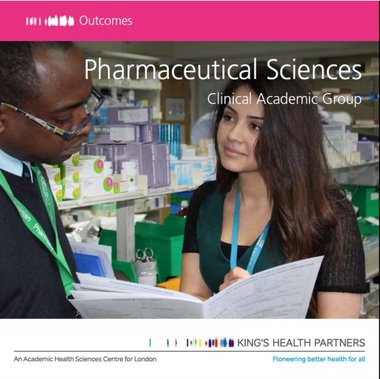29 October 2019
Our Pharmaceutical Sciences Clinical Academic Group has recently developed a scorecard to provide an annual update on key outcomes. We found out how it's helping communicate these to staff, students and beyond.
Outcomes in healthcare can be defined as changes in the health of a patient, so, therefore, improving outcomes is the core purpose of all healthcare interventions.
All specialities across King’s Health Partners are engaged in work to make their outcomes more transparent to patients, clinicians and staff through the publication of Outcomes Books. By measuring and publishing outcomes on a regular basis it is easier to reflect on progress, share best practices and lessons learnt.
Having published an Outcomes Book in 2016, the Pharmaceutical Sciences Clinical Academic Group (CAG) has recently developed an outcomes scorecard. Outcome scorecards serve multiple functions but primarily will be used to provide an annual update on key outcomes recorded by the CAG and achievements in education and research.
By presenting the outcomes scorecard as a poster, partners would have the opportunity to put it on display for all staff, students and patients to see.
Outcomes scorecards also exist as a source of intelligence to open conversations about how and where to prioritise efforts to improve care across the health system.
We spoke to Professor David Taylor, Pharmaceutical Sciences CAG Leader, to find out more:
Why was it important for the Pharmaceutical Sciences CAG to produce an outcomes scorecard?
There are two broad reasons. Firstly, so that members of the CAG feel as though they are part of a single entity and can see what is being achieved each year. The CAG has 850 staff and 1,000 students spread across King’s Health Partners. The outcomes scorecard can make them more aware of the breath of activity within the CAG and the connections between the three partner trusts and King’s College London. It is especially encouraging to see how the work of our CAG has affected healthcare inside and outside King’s Health Partners.
This is the first time that some of the outcomes have been calculated for the CAG. What has it revealed?
The outcomes scorecard is an opportunity to celebrate some of our achievements. The strength of our research base may come as a surprise to some – Pharmaceutical Sciences within King’s Health Partners is too often thought of as a teaching organisation rather than a research organisation. The fact that the CAG has 95 PhD students, and 10 staff with internationally leading H indexes (a measure of productivity and citation impact), demonstrates that the CAG are improving our performance in this area. Since 2009, the number of papers published by the Pharmaceutical Sciences CAG has surpassed 2,000.
Can you tell us more about the clinical academics?
Clinical-academic awards recognise the work undertaken by our staff to further the tripartite mission of advancing health and wellbeing through integrating research, clinical care and education. It is a rigorous process of determining people’s contribution to teaching and research. We have 31 individuals within the CAG who have been awarded clinical academic status. Their contribution ensures our taught programmes stay clinically up-to-date and relevant in addressing the needs of our patients. It also ensures that the research we do is patient-focused and translatable.
Can you tell us the benefits will have for patient care?
Having skilled and confident pharmacists more involved in the delivery of clinical care will undoubtedly be of benefit to patients. Pharmacists have a high level of expertise in the therapeutic use of medicines. Having pharmacists able to prescribe has been shown to provide benefits for patients in accessing medication advice and review. The local community mental health services in south east London have a pharmacist attached to their teams. Research has shown that where pharmacist medication reviews occur, inpatients can be discharged sooner, meaning shorter stays in hospital.
What’s in store for the next outcomes scorecard?
By publishing outcomes, we have more information to support us in measuring the value of the healthcare we provide.
Regular outcomes reporting allows us to benchmark our performance over time and lets us reflect on progress across the partnership. By reporting on the same measures annually we’ll be able to drive improvement year on year by understanding where the CAG is succeeding and where there is still more to be done. Ultimately outcomes need to be meaningful for our staff, students and patients so we’ll expand on some of them to show more detail. The scorecard is an example to other CAGs on what can be done to visualise data in order to provide accessible and transparent outcomes information.
The King’s Health Partners Pharmaceutical’s Clinical Academic Group is unique as the world’s only formal healthcare/academic partnership in pharmaceutical sciences.





